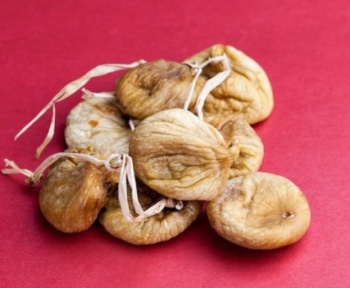Introduction
Dried figs are delicious and pack a significant nutritional punch, making them popular for health-conscious individuals across the UK and the USA. Known for their high fiber, vitamins, and mineral content, these chewy, naturally sweet fruits offer various health benefits. In this article, we’ll explore why dried figs are considered a nutritional powerhouse, looking at their unique nutrients, health benefits, and how to incorporate them into your diet.
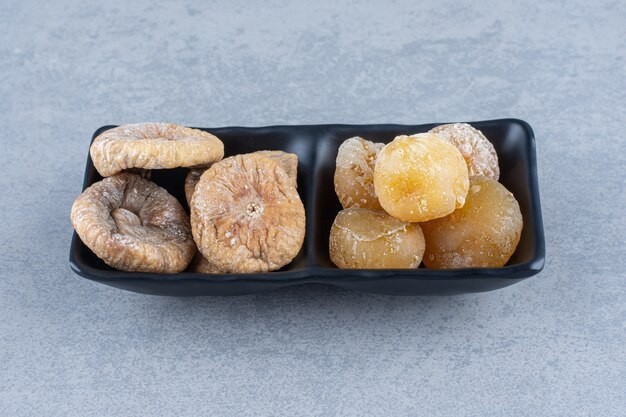
What Are Dried Figs?
Dried figs are fresh figs dehydrated, either naturally under the sun or through mechanical processes. This process removes most of the water content, concentrating their nutrients and enhancing their shelf life. Here’s a quick look at the most popular types of dried figs:

Nutritional Profile of Dried Figs
Dried figs offer an impressive array of nutrients, which include fiber, vitamins, and minerals essential for overall health. Here’s a breakdown of their nutrient profile:
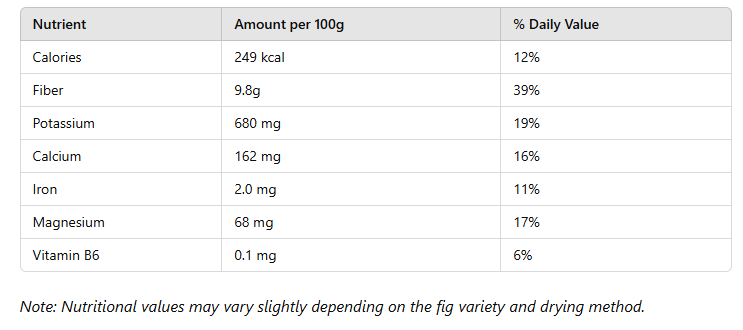
Why Dried Figs Are a Health Powerhouse
Dried figs offer various health benefits thanks to their rich nutritional profile:
- High in Antioxidants: Dried figs contain antioxidants, such as polyphenols and flavonoids, that help protect cells from damage.
- Supports Digestive Health: With almost 40% of the daily fiber requirement, dried figs aid digestion and support a healthy gut.
- Bone Health: The combination of calcium, magnesium, and phosphorus in figs promotes strong bones and prevents osteoporosis.
- Improves Heart Health: Potassium in dried figs helps regulate blood pressure and supports heart function.
- Regulates Blood Sugar: With a low glycemic index and fiber, figs help manage blood sugar levels.
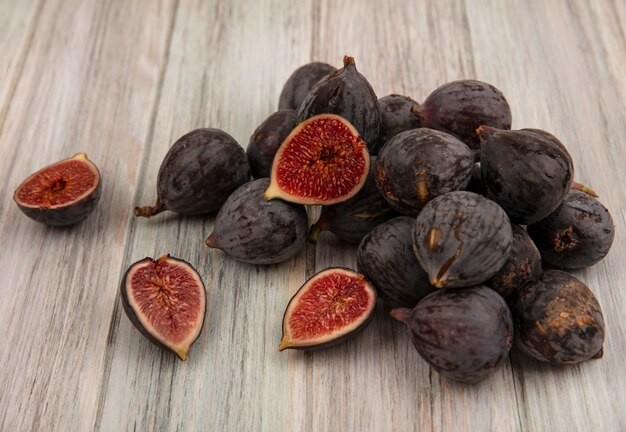
Top 10 Health Benefits of Dried Figs and How They Work
Let’s dive deeper into the specific ways dried figs can benefit your health:
- Rich in Dietary Fiber: Promotes a healthy digestive system and aids in weight management.
- Natural Source of Energy: The natural sugars in figs provide an energy boost without the crash of refined sugars.
- Anti-inflammatory Properties: Helps reduce inflammation and benefits those with arthritis.
- Supports Skin Health: Antioxidants in figs combat skin aging and promote a radiant complexion.
- Improves Immune System: Vitamin B6 and other antioxidants strengthen immune defenses.
- Boosts Heart Health: Fiber and potassium improve heart health by reducing cholesterol levels.
- Supports Eye Health: Vitamin A and other antioxidants improve vision and prevent age-related degeneration.
- Manages Blood Pressure: Potassium levels in figs counterbalance the negative effects of sodium in the diet.
- Aids in Blood Formation: Iron in figs helps prevent anemia and supports red blood cell production.
- Balances Hormones: Phytoestrogens in figs may help balance hormones, especially beneficial for women.

Interview with a Nutrition Expert: The Power of Dried Figs in Modern Diets
To gain more insight into the health benefits of dried figs, we spoke with Dr. Sarah Williams, a leading nutritionist and wellness consultant based in the UK. She shared her perspective on why dried figs are an excellent addition to a balanced diet.
“Dried figs are not only a sweet, satisfying snack but also a powerful source of fiber, which can help you feel full longer and manage cravings naturally,” she explains.
Sarah emphasizes the importance of portion control, adding, “When eaten in the right amounts, dried figs can be a “Dried figs are truly one of nature’s hidden gems,” says Dr. Williams. “They provide a rich source of fiber, essential minerals like potassium and calcium, and natural antioxidants that support overall health. For individuals looking to improve digestion, boost energy, or maintain healthy blood pressure, adding a few dried figs to their daily intake can make a remarkable difference.”
How Dried Figs Compare to Other Dried Fruits
How do dried figs stack up against other popular dried fruits? Here’s a quick comparison:
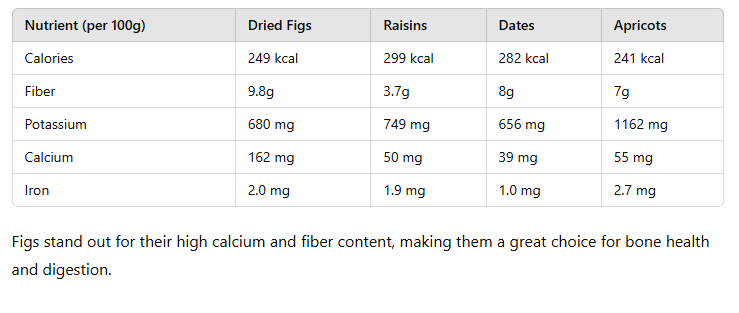
Tips and Best Practices for Choosing High-Quality Dried Figs
Choose high-quality options and store them properly to get the most out of dried figs. Here are some tips:
- Selecting Fresh Figs: Look for plump figs free from sugar crystallization and with a pleasant aroma.
- Organic vs. Conventional: Organic figs are often pesticide-free, making them a cleaner choice.
- Storing Dried Figs: Store in an airtight container in a cool, dry place for maximum shelf life.

Creative Ways to Incorporate Dried Figs into Your Diet
Dried figs can be enjoyed in various recipes or as a standalone snack. Here are some ideas:
- Energy Balls: Blend figs with oats, almonds, and a touch of honey to create easy, healthy snacks.
- Fig & Cheese Salad: Pair figs with arugula, goat cheese, and walnuts for a refreshing salad.
- Smoothies: Add a few figs to your morning smoothie for natural sweetness and fiber.
- Baked Goods: Substitute figs for raisins in cookies, muffins, or bread.
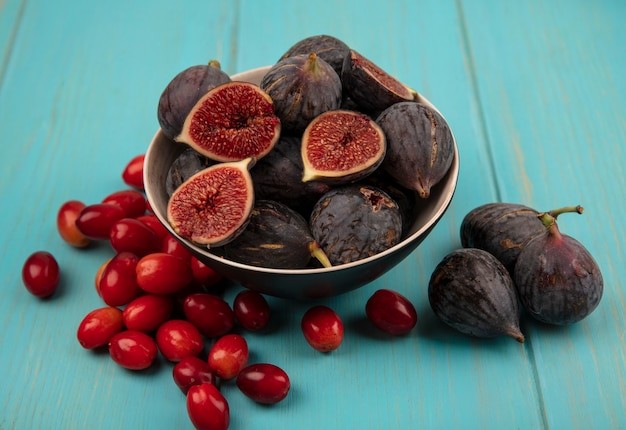
Potential Downsides and Precautions of Consuming Dried Figs
Although dried figs offer numerous health benefits, there are a few considerations:
- High Natural Sugar Content: While naturally occurring, the sugars can impact blood sugar levels, especially for people with diabetes.
- Moderation is Key: Overconsumption may lead to bloating or stomach discomfort due to the high fiber content.
- Possible Allergies: Some individuals may experience mild allergic reactions.
Recommended Daily Serving: Most individuals will enjoy the health benefits of 2-3 dried figs without excess sugar or calories.
Conclusion: Dried Figs—Nature’s Nutritional Powerhouse
Dried figs are a convenient, tasty, and nutritious addition to a balanced diet. Figs bring numerous benefits, from boosting digestive health to supporting bone strength and immunity. Whether snacking on them alone or incorporating them into recipes, these small fruits pack big nutrition. Add dried figs to your diet today and experience the benefits of this ancient superfood.
FAQs
Both types offer unique benefits. Dried figs have concentrated nutrients, while fresh figs have a lower calorie and sugar content.
Eating 2-3 figs daily is generally recommended to balance benefits with calorie intake.
Yes, their fiber can help you feel full, making them a great snack in moderation for weight management.
Dried figs have a low glycemic index but should still be consumed in moderation by individuals with diabetes.




